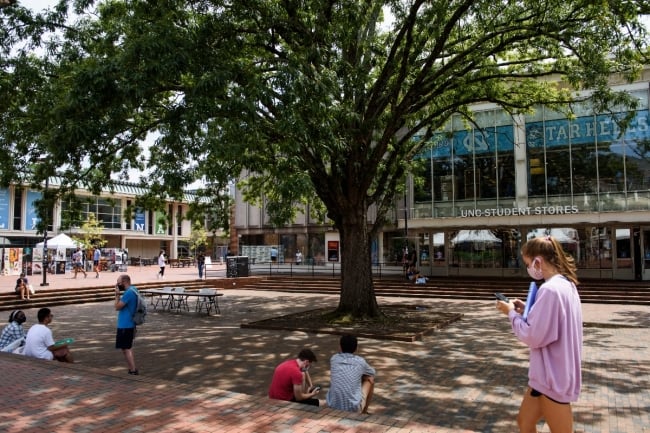You have /5 articles left.
Sign up for a free account or log in.

“To tell students to go to class on Monday, and then the next day they can mourn is just absolutely disgusting to me,” one student said.
Melissa Sue Gerrits/Getty Images
The University of North Carolina at Chapel Hill canceled classes yesterday so students could observe a “wellness day” following a death by suicide and an attempted suicide last weekend, as reported by the UNC police log. The log recorded another suicide Sept. 4 and an attempted suicide Sept. 22.
“We are in the middle of a mental health crisis, both on our campus and across our nation, and we are aware that college-aged students carry an increased risk of suicide,” Chancellor Kevin Guskiewicz wrote in a message to students. “This crisis has directly impacted members of our community -- especially with the passing of two students on campus in the past month. As chancellor, a professor and a parent, my heart breaks for all those whose suffering goes unnoticed.”
The announcement from Guskiewicz came after leaders of UNC undergraduate, graduate and professional student governments called for a pause in instruction Monday and Tuesday.
“Students require this immediate action from the university to ensure that their mental health needs are being considered and met,” they wrote in a statement.
In his announcement, Guskiewicz encouraged students to use the day off Tuesday -- World Mental Health Day -- “to rest and to check in with each other.”
But for some students, that wasn’t nearly enough. Kendra Randle, a junior at Chapel Hill, said canceling classes just on Tuesday instead of on both days was misguided. (This paragraph has been updated to correct Kendra Randle's year.)
“To tell students to go to class on Monday, and then the next day they can mourn is just absolutely disgusting to me,” Randle said.
Lamar Richards, president of the UNC Chapel Hill Undergraduate Student Government, tweeted Sunday night that professors who were still holding classes Monday were part of the problem.
“We are not machines with on and off switches,” Richards wrote. “I don’t care what ‘you’re not allowed to do.’ We are students and we need a break. On behalf of my 30,000 peers, consider us all excused.”
Plenty of students took Monday off anyway, Randle said.
“A lot of students are just taking a break to mourn and get their emotions out and recover from this weekend,” Randle said. “But also some professors have been very accommodating and sending out messages to make sure that we’re taking care of ourselves and that school is not the priority right now.”
Even the university’s independent student-run newspaper, The Daily Tar Heel, announced it would operate on a reduced schedule this week to allow its staff “time to rest and to prioritize their mental health.”
Other students have been circulating a petition calling on the university to take action to help students recover from the loss of their peers. As of Tuesday evening, the petition started by Savannah Worrell on Saturday had over 2,000 signatures.
In his statement, Guskiewicz announced the university would take additional measures to address mental health on campus, including hosting a mental health summit with faculty, staff and student leaders to “work together to address this national crisis.” He also said the university would launch Heels Care Network, a campuswide campaign to promote and support mental health awareness.
This week the university has created both virtual and in-person spaces on campus staffed by experts from Counseling and Psychological Services (CAPS), the Department of Psychiatry, the School of Medicine and the School of Social Work, where students, faculty and staff can come together to speak about their experiences.
Randle said that in the past, some of her peers have been disappointed by CAPS, which sometimes refers students to outside clinics with limited appointment availability. She added that she hopes the university will provide CAPS with more funding and resources so it can offer more students immediate help.
“Telling us that CAPS is available is great, but when CAPS cannot sustain the students that come in with their mental health problems, then what’s the point of representing them?” Randle said.
Increase in Student Mental Health Needs
Students everywhere are struggling with myriad issues including anxiety, depression, nervousness about returning to in-person learning, financial hardships and mourning the loss of friends and family members to COVID-19, according to Nance Roy, the chief clinical officer of the Jed Foundation, a nonprofit that works to protect mental health and prevent suicide among teenagers and young adults.
“It’s the uncertainty that we’re facing right now that I think really generates the higher levels of anxiety that we’re seeing,” Roy said. “There’s quite a list of concerns that folks have had to manage during this time, and students are included among them.”
In June 2020, one in four people aged 18 to 24 seriously contemplated suicide, according to research from the Centers for Disease Control and Prevention. Since the beginning of the pandemic, experts have been urging colleges to invest in mental health services rather than slash their budgets.
And when a death by suicide does occur on campus, it’s crucial that universities respond appropriately, Roy said. Postvention: A Guide for Response to Suicide on College Campuses is a comprehensive guide created by the Jed Foundation and other mental health organizations that offers institutions advice on what kind of support services they should offer, whether or not they should hold a memorial for the student, and how to communicate the news of a suicide to students and families.
According to the Jed Foundation, a good post-event plan can help maintain community stability and ensure effective outreach during a crisis. And while a mental health day is good for students, Roy said, mental health isn’t something that’s going to get solved in one day.
“The issues that we’re seeing on campuses, it’s going to take deliberate, sustained attention to really move the needle on promoting mental health and reducing suicides,” Roy said.
It’s important that institutions adopt a “comprehensive approach,” she said, which means also helping students develop life skills, such as self-care and good nutrition; promoting social connectedness; identifying students at risk; encouraging help-seeking behaviors; and providing mental health and substance abuse services.
“We really believe that if you want to move the needle on preventing suicides on campus and promoting positive health, you need to look at all of those elements,” Roy said. “Our program, when we work with a school, will sit with them and assess what things do they have in place in each of those domains, and where are the gaps.”
The rise of telehealth options during the pandemic has made it easier and more convenient for students to get help for mental health issues. Teletherapy also allows institutions to manage volume by using third parties, which can prevent counseling centers from being swamped with students.
Moreover, Roy said, addressing and preventing suicide among college students requires a campuswide approach. Mental health issues can’t be relegated to health and counseling centers, she said -- “everyone has a role to play.”
“We really need to take a public health approach where everyone takes responsibility, not for providing therapy, but for supporting students and their emotional well-being and getting support from senior leadership,” Roy said. “We find if we don’t have those two underlying principles in place, it’s very difficult to move the needle in any kind of long-term, systemic way.”
At Chapel Hill, some faculty members have expressed support for students taking days off to take care of their mental health. Mimi Chapman, a professor and chair of faculty governance, wrote a message to the campus community telling them they are worth something, no matter what they do or don’t achieve. Sara Smith, a political geography professor, called on faculty to take the time to check in with students.
“Fellow faculty, there’s nothing preventing you from checking in with your students now to see what they need from you this week,” Smith wrote. “Follow the leadership shown by our students.”







